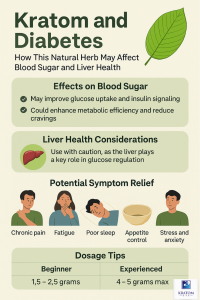🌿 Kratom and Diabetes: How This Natural Herb May Affect Blood Sugar and Liver Health
Exploring Kratom’s Impact on Glucose Regulation, the Liver, and the Pancreas
As more people look for natural ways to manage chronic health conditions, kratom has entered the conversation—not just for its pain-relieving and mood-enhancing properties, but also for its potential effects on blood sugar and liver function. People with diabetes are particularly interested in whether kratom can help regulate glucose levels, improve energy, or reduce inflammation. This in-depth article explores what research, biology, and user experience tell us about kratom and diabetes, including its effects on blood sugar regulation, liver function, and its potential role in natural wellness routines.
📌 Key Points: Kratom and Diabetes
-
🧪 Kratom may influence blood glucose levels through indirect mechanisms, though studies are limited
-
🔬 Kratom interacts with receptors that may impact insulin sensitivity and inflammation
-
⚠️ The liver and pancreas work together to manage blood sugar; kratom’s effect on the liver must be considered
-
💊 Users report improved energy, appetite control, and pain relief with kratom use
-
📉 More human studies are needed before kratom can be considered a reliable aid for diabetes
🧬 How the Body Regulates Blood Sugar: The Role of the Liver and Pancreas
To understand kratom’s possible effects on blood sugar, it helps to know how glucose regulation works.
🩺 Key Players:
-
Pancreas – Releases insulin (lowers blood sugar) and glucagon (raises it)
-
Liver – Stores and releases glucose depending on your body’s energy needs
-
Insulin Resistance – A key issue in Type 2 diabetes, where cells stop responding to insulin properly
Any substance that alters liver enzymes, metabolic function, or appetite could influence this delicate system—and kratom may be one such substance.
🔬 What the Science Says: Kratom’s Potential Role in Blood Sugar Control
 While direct studies on kratom and diabetes are limited, a few relevant studies and biochemical observations provide some insights.
While direct studies on kratom and diabetes are limited, a few relevant studies and biochemical observations provide some insights.
🧪 Animal Studies
-
A 2017 study published in Journal of Ethnopharmacology found that mitragynine, kratom’s main alkaloid, reduced blood glucose levels in rats.
-
Researchers observed that mitragynine could enhance glucose uptake and improve insulin signaling.
⚖️ Human Observations (Anecdotal and Early Research)
-
Some users with Type 2 diabetes report:
-
Improved energy and alertness
-
Fewer sugar cravings
-
Less pain, allowing more physical activity
-
-
Others have reported hypoglycemia-like symptoms, especially when fasting or using kratom on an empty stomach
🧠 Theory: Kratom may enhance metabolic efficiency, reduce pain-related inactivity, and suppress excessive appetite—all indirectly helpful for people managing diabetes.
🍃 Kratom and the Liver: What You Should Know
Since the liver processes kratom, people with diabetes (who may already have liver strain or fatty liver disease) need to be cautious.
📉 Potential Liver Concerns:
-
A 2020 review in Clinical Liver Disease suggested that high doses or adulterated kratom products could be associated with liver enzyme elevations
-
However, liver damage appears rare and typically resolves after discontinuation of use
🛡️ Tips for Liver-Safe Kratom Use:
-
Use only lab-tested, unadulterated kratom from reputable vendors
-
Avoid daily high doses—stick to 2–4g with tolerance breaks
-
Monitor liver enzymes if using kratom regularly and managing diabetes
💊 Can Kratom Help with Diabetes Symptoms?
Here are the most relevant symptoms of diabetes that kratom may support:
| Symptom | How Kratom Might Help |
|---|---|
| Chronic pain | Kratom offers opioid-like pain relief without prescription drugs |
| Fatigue | Low doses (white or green strains) provide energy and motivation |
| Poor sleep | Red strains promote relaxation and sleep quality |
| Appetite control | Many users report reduced cravings and suppressed appetite |
| Stress and anxiety | Kratom helps regulate mood and cortisol levels |
📖 A 2018 study in Drug and Alcohol Dependence found that kratom may improve mood and reduce anxiety, which are key challenges in diabetes management.
🍵 Best Kratom Strains for Managing Diabetes-Related Symptoms
| Strain | Effect |
|---|---|
| Green Maeng Da | Energy + moderate pain relief + focus |
| White Thai | Mild stimulation and appetite suppression |
| Red Bali | Deep pain relief and better sleep |
| Green Malay | Balanced energy and mood stabilization |
✅ These strains are commonly chosen for their long-lasting, clean effects that align with diabetes symptom management.
📏 Kratom Dosage Tips for People with Diabetes
| Experience Level | Recommended Dose |
|---|---|
| Beginner | 1.5 – 2.5 grams |
| Intermediate | 2.5 – 4 grams |
| Experienced | 4 – 5 grams max |
🕒 Take kratom after a light meal to avoid blood sugar dips. Avoid sugary additives in kratom tea.
⚠️ Precautions for Diabetic Users
-
❗ Always consult your doctor, especially if you’re on insulin or oral hypoglycemics
-
✅ Use lab-tested kratom only
-
⛔ Avoid combining with alcohol or liver-straining medications
-
🧪 Monitor your blood glucose levels before and after use
❓ FAQ: Kratom and Diabetes
Can kratom help lower blood sugar?
Animal studies suggest kratom may lower blood sugar levels, but human data is lacking. It may indirectly help via reduced cravings and inflammation.
Is kratom safe for people with diabetes?
Many users report benefit, but those with liver conditions or on medications should consult a doctor first.
Does kratom affect insulin levels?
It may improve insulin sensitivity according to preliminary research, but more studies are needed.
Which kratom strain is best for energy with diabetes?
Green Maeng Da or White Thai are preferred for energy without overstimulation.
Can kratom damage the liver?
Rarely, and usually with high doses or adulterated products. Stick to pure, lab-tested kratom.
🌿 Final Thoughts: Should People with Diabetes Use Kratom?
While kratom is not a treatment for diabetes, it may offer valuable symptom relief—especially for pain, energy, appetite control, and inflammation. It also interacts with pathways that affect metabolism and insulin function, which deserves further scientific exploration.
As with all natural remedies, kratom should be used responsibly, in moderation, and under medical supervision—particularly for people with chronic conditions like diabetes.
Ready to explore premium, tested kratom strains? Visit KratomUSA.com to browse safe, effective options trusted by thousands.


